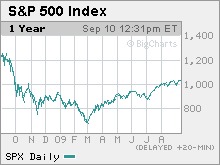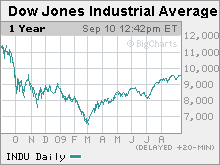Is this rally for real?
Stocks have been on a record run. We asked the experts where they go from here.


NEW YORK (Fortune) -- If you had the courage to buy stocks when the market hit bottom in March, congratulations! The S&P 500 and Dow Jones industrial indexes are near highs for the year after soaring around 50% since then.
But if you've been waiting on the sidelines as improving unemployment, housing, and GDP numbers surprise Wall Street pros, you may now be wondering, Should I still buy in, or is the rally over?
To try to answer that question, we talked to some of the smartest market watchers we know. Despite some big worries about 2010, most expect the combination of market momentum and government stimulus spending to carry stocks higher for the rest of this year.
Let's start with the most enthusiastic, Laszlo Birinyi, founder of Birinyi Associates, who notes that the current rally is the strongest ever. Since hitting its closing low of 676 on March 9, the S&P 500 (SPX) has risen 0.31% a day on average, he says. That is three times faster than the previous fastest recovery in 1982, which averaged a 0.12% per day rise. "This is the Usain Bolt of markets," Birinyi says. "We just blew through the records."
Birinyi, who warned his clients in October 2007 of impending doom in bank stocks, expects more gains this year, in part because "no one is calling this a bull market." Negative sentiment, of course, is a classic contrarian indicator that stocks will keep climbing. Birinyi advises buying S&P 500 SPDRs (SPY) to take advantage of the broad market rally.
Longtime bear Steve Leuthold, chairman of influential research firm The Leuthold Group, also takes comfort in the widespread fear of stocks. He sees the S&P index reaching 1200 to 1250 by year-end, a 20% jump from its current level of about 1000.
Leuthold, who was bearish most of this decade, says stocks are fairly priced now but will keep rising because they usually overshoot normal valuations in a recovery. "There's money to be made over the next six months," says Andy Engel, a portfolio manager at Leuthold Group.
Jeremy Grantham, the chairman of money management firm GMO, who encouraged his clients to buy stocks on March 10 with a note titled "Reinvesting When Terrified,'' says the S&P 500's fair value is 880 based on earnings estimates and historical P/E ratios.
Even so, Grantham thinks the index "can go quite a lot further in the next two or three months." He says the recent rally has not been based on fundamentals. Instead, the government's stimulus plan and bailouts of banks and carmakers artificially inflated sectors of the economy.
Grantham likes to compare today's market rise with the 1930 rally that followed the crash of 1929. That 47% surge came without bank bailouts and stimulus spending. "If you turn on the moral-hazard juice and stimulus, which we did this time, [the market] is entitled to do a whole lot more than 47%," he says.
Grantham thinks the S&P could rise to 1130 by year-end. But his longer-term view is cautious. He warns that the market may again fall below its March low before resuming tepid growth. Grantham advises buying U.S. blue chips for what he predicts to be "seven lean years'' for stocks.
Back in January, Bob Doll, global chief investment officer of equities at BlackRock, saw the potent combination of low interest rates and an expected wave of government stimulus spending. Doll, who oversees $400 billion in equities, forecast that the S&P 500 would end the year between 1000 and 1050. Now that the index has entered that range, he says that stocks could dip 10% at some point before year-end, since skittish investors are ready to sell on any disappointing economic data.
That would be a buying opportunity. In the short-term, says Doll, slow economic growth will help stocks by keeping inflation in check. In the first three quarters of a recovery, he says, GDP typically grows at a 6.7% rate.
For the current recovery BlackRock expects the rate to be half that. Doll recommends buying high-quality stocks -- those with strong franchises and solid balance sheets -- in health care, energy, and technology.
A more somber view comes from Robert Shiller, the Yale economics professor famous for calling the stock market and housing bubbles. He already considers stocks overpriced based on his P/E calculation, which averages earnings over 10 years.
And factoring in problems like still-troubled bank balance sheets and government stimulus propping up bad businesses, he says, "the stock market is not looking so enticing right now. It's already a little pricey, so the expected return is probably not the historical average."
Back to our question: Should you buy stocks today? For starters, don't expect the market to maintain the dizzying pace of the past few months. But don't hoard all your money and wait for a big pullback.
As always, the most sensible approach is to put money in at regular intervals, a strategy that lets you both participate in the rallies and buy on the dips. ![]()
-
 The retail giant tops the Fortune 500 for the second year in a row. Who else made the list? More
The retail giant tops the Fortune 500 for the second year in a row. Who else made the list? More -
 This group of companies is all about social networking to connect with their customers. More
This group of companies is all about social networking to connect with their customers. More -
 The fight over the cholesterol medication is keeping a generic version from hitting the market. More
The fight over the cholesterol medication is keeping a generic version from hitting the market. More -
 Bin Laden may be dead, but the terrorist group he led doesn't need his money. More
Bin Laden may be dead, but the terrorist group he led doesn't need his money. More -
 U.S. real estate might be a mess, but in other parts of the world, home prices are jumping. More
U.S. real estate might be a mess, but in other parts of the world, home prices are jumping. More -
 Libya's output is a fraction of global production, but it's crucial to the nation's economy. More
Libya's output is a fraction of global production, but it's crucial to the nation's economy. More -
 Once rates start to rise, things could get ugly fast for our neighbors to the north. More
Once rates start to rise, things could get ugly fast for our neighbors to the north. More







